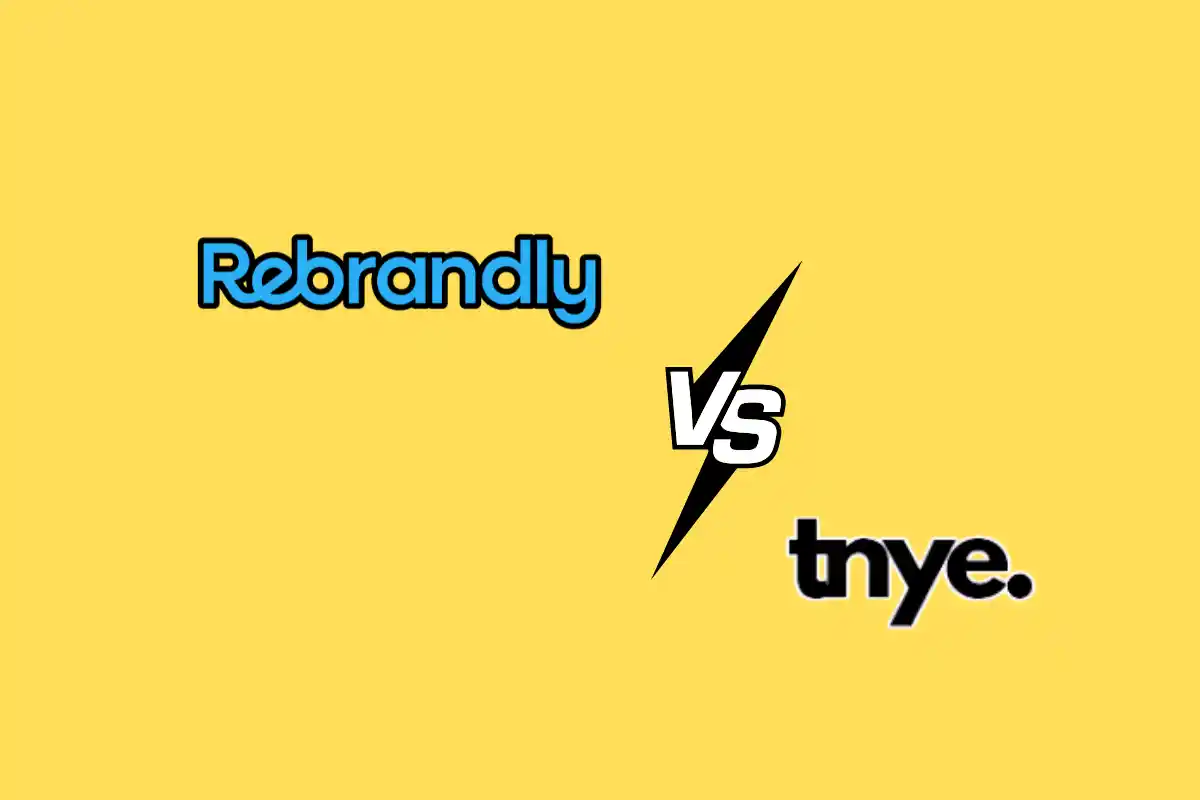When choosing a URL shortener for a business, it involves branding, analytics, and engagement. With so many options available, making the right pick can shape how efficiently campaigns run and how well performance is measured.
Rebrandly and Tnye are two distinct players in this space. Rebrandly has long been known for its focus on branded links and advanced tracking. Tnye, on the other hand, is a newer solution that’s quickly gaining attention for its speed, targeting tools, and pixel support.
This guide isn’t about picking a clear winner. Instead, it’s designed to help match the right tool to the right needs. Whether someone is after deep linking, campaign retargeting, or simplicity and flexibility, understanding what each platform offers (and doesn’t) is what truly matters here.
Let’s break them down and see how they compare.
Overview of Rebrandly
Rebrandly has built its reputation around branded link management. Its platform is designed for businesses that care about turning every shortened URL into a marketing asset. With Rebrandly, the link itself becomes part of a brand’s identity.
At the core, Rebrandly allows users to create custom domains and use them as the base for every short link. This is perfect for businesses that want their links to reflect brand consistency across campaigns, social posts, emails, and ads.
Beyond branding, Rebrandly also offers robust analytics and advanced features like deep linking. Deep linking helps direct mobile users straight into app content instead of just landing pages. It is a big win for businesses with strong app strategies.
The platform integrates with popular tools like Google Analytics, Slack, Zapier, and Bitrix24, which adds to its versatility. It also has a clear pricing structure and several tiers to accommodate different needs, from startups to enterprises.
That said, Rebrandly can feel overwhelming at first if someone is just looking for a simple shortener. The feature set is broad, which is great for power users, but may be more than needed for simpler campaigns or quick link edits.
Still, for brand-focused teams or marketers managing large-scale link operations, Rebrandly is a well-established and reliable option.
Overview of Tnye
Tnye enters the URL shortener space with a modern twist: speed, flexibility, and performance-focused features. While still growing in visibility, it’s already carving a niche among marketers who care about retargeting and link-level customization.
One standout feature is the ability to add tracking pixels to each Tnye link. It lets users plug retargeting directly into any campaign, even without having full control over the destination website. It’s a game-changer for ad professionals and affiliate marketers.
Tnye also supports destination targeting based on language, device type, or location. That means a single short link can direct users to different landing pages depending on their context. This kind of control is valuable for businesses running global or segmented campaigns.
Another plus is its lightweight interface. Creating and managing links is fast and clean with no fluff, just the essentials. While it lacks features like deep linking for now, it’s clear that the platform is evolving and prioritizing the tools marketers care about most.
Where it falls short is clarity on premium pricing. While it’s free to use now, and many features are available upfront, the future cost for advanced use isn’t fully detailed yet. That could be a point of concern for long-term planners.
Overall, Tnye is best suited for users who value performance metrics, ad optimization, and speed over broader enterprise-focused branding features. It’s a lean, focused tool that gets the job done fast.
Feature Comparison: What Each Tool Offers
When comparing Rebrandly and Tnye, it’s important to look at the features that matter most for business needs: branding, tracking, customization, integrations, and overall user experience.
Rebrandly shines in branded links. It allows full control over the link domain, slug, and link routing. Tnye, while not focused on branding, emphasizes targeting and ad performance. It supports pixel tracking, allowing marketers to retarget audiences even from third-party pages.
Deep linking is another point. Rebrandly includes it for mobile apps, guiding users to specific content. Tnye currently doesn’t offer this, but its device-based targeting still helps route users effectively based on context.
Analytics is a shared strength. Both platforms offer click metrics, traffic breakdowns, and performance data. Rebrandly’s analytics are more polished at the moment, while Tnye is leaner but still effective, especially for tracking ad campaigns.
Integrations also play a role. Rebrandly supports a wide range of third-party apps. Tnye is still building out this part and already offers integration with various third-party platforms. It also allows URL-based tracking with pixels, giving it a different kind of versatility.
For ease of use, Tnye feels snappier and more lightweight. Rebrandly provides more depth, but its interface may take longer to get comfortable with.
Pros and Cons of Rebrandly
Here’s a quick look at what works and what might not for Rebrandly.
Pros:
- Strong support for branded custom domains
- Built-in deep linking for mobile apps
- Clean, professional analytics dashboard
- Wide range of third-party integrations
- Clear pricing structure with tiered plans
Cons:
- Can feel overwhelming for basic users
- Some advanced features are locked behind paid tiers
- May be overkill for simple link-sharing tasks
Pros and Cons of Tnye
Tnye has a different focus. Let’s break down its main strengths and current limitations.
Pros:
- Built-in support for tracking pixels
- Fast, lightweight interface
- Supports destination targeting by device, location, and language
- Offers so many tools, which are highly useful to marketers
- Free access to many core features
Cons:
- No deep linking support (yet)
- Not widely recognized or popular (yet)
- The pricing models for future premium features aren’t clearly defined
Use Cases: Who Should Use Rebrandly? Who Should Use Tnye?
Not every tool is built for every purpose. Depending on how you use links in your business, one platform might serve you better than the other.
Who Should Use Rebrandly?
Rebrandly is a strong fit for businesses focused on building and protecting brand identity through links. If custom domains and polished link presentation matter, it’s a clear winner.
It’s also ideal for larger teams managing many links across departments, especially with its team collaboration features. If you’re driving mobile traffic to apps or need deep linking for campaigns, Rebrandly has that built in.
Marketers working with enterprise clients or agencies juggling multiple branded domains will likely find its structure and integrations especially helpful.
Who Should Use Tnye?
Tnye works well for those focused on tracking performance and conversions rather than presentation. If you’re running ads, working with influencers, or testing offers on different audiences, Tnye’s pixel support and targeting options will stand out.
Not to mention, Tnye offers several more useful tools, such as QR code generation and tracking, DNS lookup, password strength checking, and slug generation.
It’s a great tool for solo marketers, small teams, and anyone who wants to keep things lightweight and fast. Since the core features are currently free, it’s also a smart pick for businesses on a tight budget who still need analytics and smart link routing.
Final Thoughts: Finding the Right Fit for You
Rebrandly and Tnye serve different purposes, and that’s a good thing. Focus on your priorities (branding or tracking, integrations or simplicity), and the right shortener will become clear.
Both tools bring real value. The key is matching the features to your current goals.







